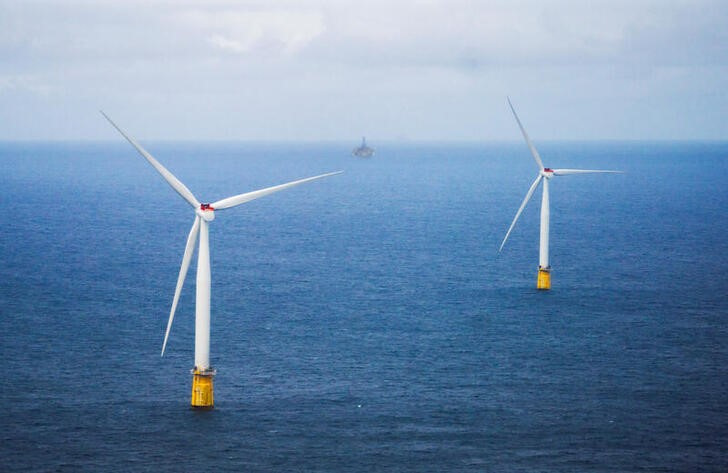By Ron Bousso
LONDON (Reuters) – Newly-elected U.S. President Donald Trump criticized the British government’s energy policy on Friday, demanding that the country “open up” the aging North Sea oil and gas basin and get rid of wind farms.
The North Sea is one of the oldest offshore oil and gas basins in the world, where production has steadily declined since the turn of the millennium. At the same time, it has become one of the largest offshore wind energy areas in the world.
“Britain is making a very big mistake. Open the North Sea. Get rid of wind turbines!” Trump said this in a message on his social media platform Truth Social.
Climate skeptic Trump has long been against wind farms. In 2015 he unsuccessfully fought plans to build one near his luxury golf course in Scotland.
His message on Friday included a link to a report last November about US oil and gas producer APA Corp’s Apache plans to leave the North Sea by the end of 2029. The company expects production in the North Sea to decline by 20% year-on-year. year 2025.
Prime Minister Keir Starmer’s Labor government won last year’s election on a promise to build Britain’s low-carbon economy. The government aims to quadruple offshore wind power generation capacity to 60 gigawatts by 2030 as part of targets to reduce carbon emissions and improve air quality.
In October, the British government said it would increase the windfall tax on North Sea oil and gas producers from 35% to 38% and extend the levy for a year. The government wants to use oil and gas revenues to raise money for sustainable energy projects.
Oil and gas companies have said the higher tax rate could lead to a drop in investment. Some companies have sold assets, while others have merged their operations and sought to diversify into other regions.
Asked about Trump’s comments, a UK government spokesperson said it would continue to prioritize a “fair, orderly and prosperous transition in the North Sea, in line with our climate and legal obligations”.
“We must replace our reliance on unstable fossil fuel markets with clean, domestic energy controlled in Britain – which is the best way to protect bill payers and increase our energy independence,” the spokesperson added.
Claire Coutinho, the shadow minister for the opposition Conservative Party, said in a post on
FALLING OIL, SLOW WIND
Oil companies have abandoned the North Sea to focus on newer basins. Production has fallen from a peak of 4.4 million barrels of oil equivalent per day (boed) at the turn of the millennium to around 1.3 million barrels of oil equivalent today.
Britain and countries in mainland Europe have overseen the development of large offshore wind farms, but the sector’s growth has stalled as costs have ballooned due to technical issues, supply chain issues and higher interest rates.
Some developers have reconsidered their investments in offshore wind energy, or taken impairment charges due to the rising costs of building wind farms that can be more than 100 km (60 miles) offshore.

Orsted (CSE:), the world’s largest developer of offshore wind farms, cut its investment and capacity targets last year.
Britain aims to largely decarbonize its energy sector by 2030, meaning reducing reliance on gas-fired power stations and rapidly increasing renewable energy capacity.


